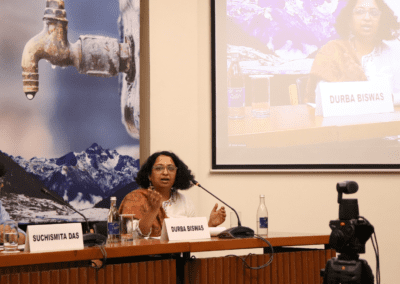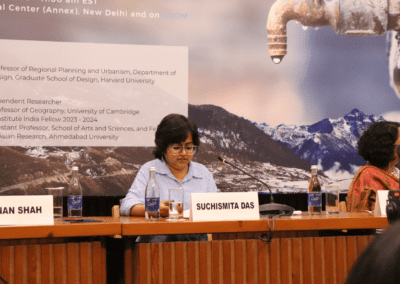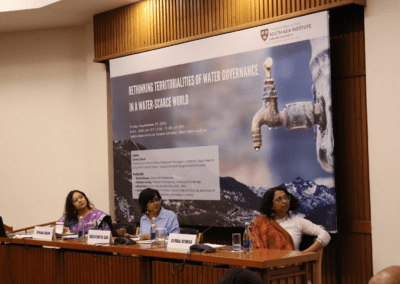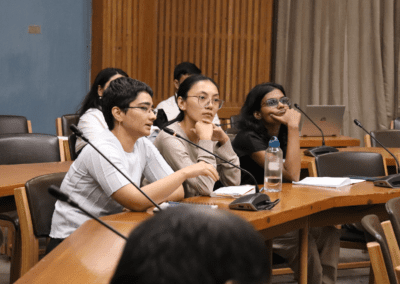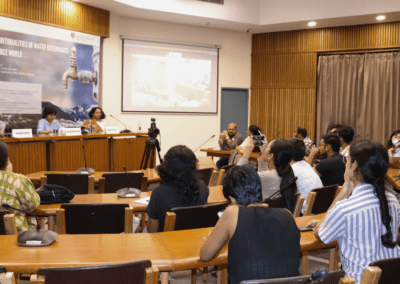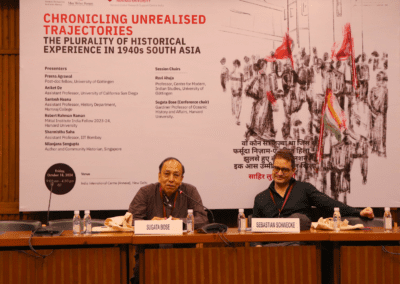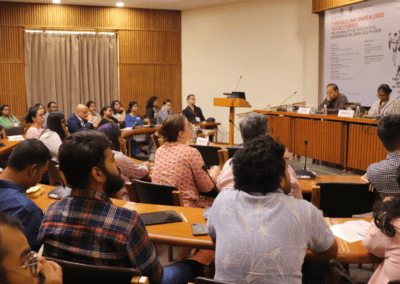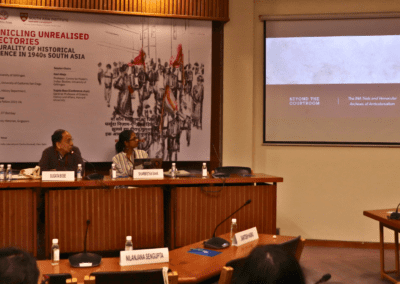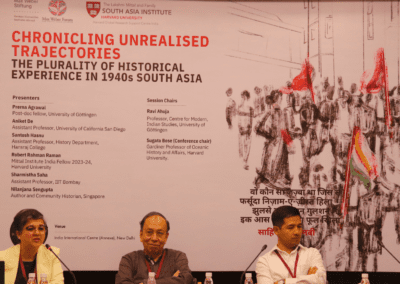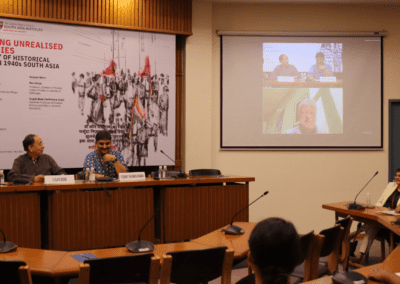Rinan Shah and Robert Rahman Raman joined as Mittal Institute India Fellows in November 2023. As their year-long fellowships draw to a close, read about their time spent at the institute, including their experiences, contributions, and explorations below.
Rinan Shah furthered her research on water security by analyzing water governance through a political geography lens under the mentorship of Diane Davis, Charles Dyer Norton Professor of Regional Planning and Urbanism, Department of Urban Planning and Design, Harvard Graduate School of Design. During her fellowship with the Mittal Institute, one of Rinan’s single-author papers on water storage as a driver for scarcity was accepted for publication, and two co-authored papers are currently under review. Additionally, she co-authored two policy analyses and participated in various academic talks and conferences. She also undertook a field trip across India documenting women-led water initiatives, which will be developed into a write-up and audiovisual project.
Rinan’s fellowship culminated in a seminar, “Rethinking Territorialities of Water Governance in a Water-Scarce World,” on September 27, 2024. In the seminar, she discussed how socio-spatial factors influence access to water in mountain towns, highlighting Darjeeling (a city in the eastern part of India) as a case study. Her insights encouraged a re-examination of water governance, stressing the importance of local perspectives and the integration of gendered concerns into policymaking.
“The larger question here is how we can look at equitable water access by not only focusing on the local household level but also access within decision-making spaces.”
The seminar, chaired by Prof. Diane Davis, included distinguished panelists Dr. Durba Biswas, an independent scholar; Prof. Matthew Gandy from the University of Cambridge; and Prof. Suchismita Das from Ahmedabad University. The discussion shed light on the systemic complexities around water scarcity, sparking conversations on how local governance structures might influence broader strategies for water security.
Watch the “Rethinking Territorialities of Water Governance in a Water-Scarce World” seminar below.

Rinan Shah presenting her paper at the “Rethinking Territorialities of Water Governance in a Water-Scarce World” seminar

Attendees at the seminar on “Rethinking Territorialities of Water Governance in a Water-Scarce World”
Robert Rahman Raman’s fellowship unfolded under the mentorship of Sugata Bose, Gardiner Professor of Oceanic History and Affairs at Harvard University. Robert deepened his research on Bombay’s (now called Mumbai) political landscape in the 1940s, particularly regarding popular mobilizations, which included a field visit to the Maharashtra State Archives. During his fellowship, one of his single-author papers and a book review were accepted for publication, with another paper under review. He also developed additional writings on Bombay’s labor activism and delivered talks at various academic venues.
Robert presented his work at a conference that he organized at the end of his fellowship titled “Chronicling Unrealised Trajectories: The Plurality of Historical Experience in 1940s South Asia,” held in New Delhi on October 18, 2024. In his presentation on “Bombay on the Eve of Independence (1946-47): Popular Solidarities and Cumulating Polarisation,” Robert emphasized the existence of alternative possibilities within a divided political framework.
“Initiatives by political and cultural activists of the city not only removed the unseen barriers dividing Bombay but underlined their specific intervention in upholding Bombay’s distinct political culture. You could see this on the day of the Independence Day in Bombay, which was unlike how Independence Day was felt in Delhi or many other places. In stark contrast to the prevailing social discord, Bombay witnessed celebrations and euphoria on the day of the Independence.”
The conference, chaired by Prof. Bose, featured a lineup of scholars, including Aniket De, Sharmistha Saha, Nilanjana Sengupta, Prerna Agrawal, and Santosh Hasnu. Ravi Ahuja, Professor at the Centre for Modern Indian Studies, University of Gottingen, chaired the session on sociopolitical complexities and diverse experiences of urban India in the late 1940s, during which Robert presented his paper. The interdisciplinary dialogue at the conference deepened the analysis of historical trajectories in the 1940s, enhancing the understanding of urban politics, popular mobilizations, and cultural transformations in South Asia.

Robert Rahman Raman presenting his paper at the conference “Chronicling Unrealised Trajectories: The Plurality of Historical Experience in 1940s South Asia”

Attendees at the day-long conference, “Chronicling Unrealised Trajectories: The Plurality of Historical Experience in 1940s South Asia”
While reflecting on their fellowship experience, the two fellows noted the importance of their research presentations at the end of their fellowship term, facilitated by the Mittal Institute. “The conference provided valuable feedback to develop [my paper] further and helped me comprehend the complexity of this historical conjuncture in a new light, which would be significant in publishing this research work,” said Robert. While speaking about her seminar, Rinan noted, “This [seminar] established my work and has provided feedback to develop it further in a publishable manuscript.”
As their fellowships come to an end, Rinan and Robert depart having made significant contributions to advancing research in their respective fields of water governance and labor mobilization in South Asia. Their work exemplifies the Mittal Institute India Fellowship’s mission to foster research with tangible impact. Stay tuned for updates on how Rinan and Robert further build on these insights and continue to contribute meaningfully to research on the region.
The Mittal Institute India Fellowship, based at the Mittal Institute India office in New Delhi, provides two post-doctoral scholars from India with an opportunity to be mentored by a Harvard faculty and access the University’s vast resources remotely. Applicants from any discipline are eligible to apply, provided their studies advance, facilitate, and promote programs in and for the public benefit of India.

